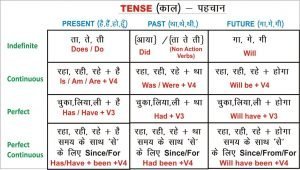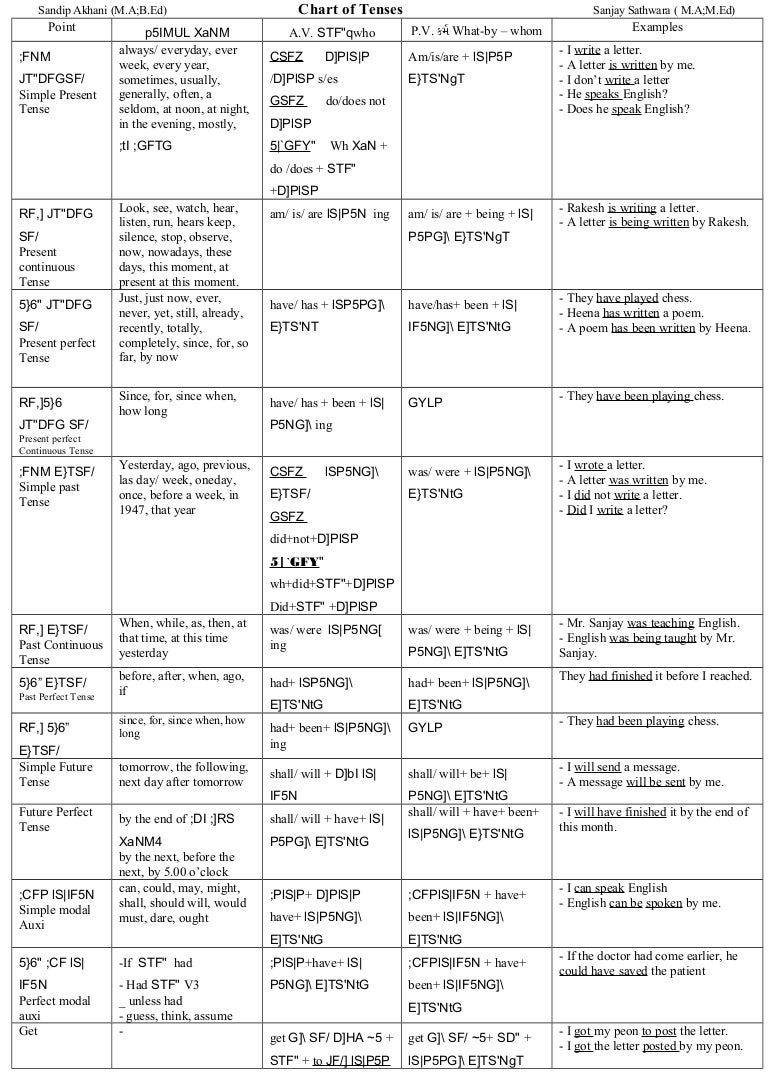- Chart Of Tenses In English Grammar
- Chart Of English Tenses In Hindi
- Chart Of English Tenses In Order
- Chart Of Tenses In English
- Chart Of English Tenses In Urdu


Chart Of Tenses In English Grammar

Introduction
Verb tenses show us when an action takes place: in the present, past or future. Each of the three main tenses has a progressive, perfect and perfect progressiveaspect which give us more information about the time, progression or completion of an action.
Chart Of English Tenses In Hindi
This table of tenses in English grammar provides an overview of the 12 different verb tenses with examples in the positive, negative and interrogative or question form. You will also find tips on the usage of each tense and common signal words to help you recognise the tenses. For a detailed lesson including exercises, click on the name of the tense.
Chart Of English Tenses In Order
Tense and aspect are important means for organizing discourse. Many linguists exclude future as a pure tense in English language, because the auxiliary will may be used to express volition. In English grammar t here are 2 main tenses: Past and Present, and 4 aspects. The tense of a verb indicates the time at which an action or state of being happens. The verbs change form to show the various tenses. Some verbs are regular in their changes, some are irregular. See a list of Irregular Verbs. Subject Exercises: Verb Tenses Exercises Also See: Tense Agreement. English Verb Tenses Do you find English verbs confusing? Take a look at this chart of English verb tenses to help you understand when to use each one: Simple Continuous Perfect Perfect Continuous Present speak / speaks am/is/are speaking have/has spoken have been speaking Past spoke was/were speaking had spoken had been speaking. English Active Tenses listed in a table. Infinitive + -ed) or (3rd column of table of irregular verbs) We sometimes use Continuous instead of Progressive. N: He does not speak. Q: Does he speak? Action in the present taking.
Chart Of Tenses In English

Chart Of English Tenses In Urdu
| Tense | positive/negative/question | Usage | Signal Words |
|---|---|---|---|
| Simple Present Present |
|
| always, every …, never, normally, often, seldom, sometimes, usually |
| Present Progressive Present Continuous |
|
| at the moment, just, just now, Listen!, Look!, now, right now |
| Simple Past Preterite | P: He spoke. N: He did not speak. Q: Did he speak? |
| yesterday, 2 minutes ago, in 1990, the other day, last Friday |
| Past Progressive Preterite Continuous | P: He was speaking. N: He was not speaking. Q: Was he speaking? |
| while, as long as |
| Present Perfect Perfect | P: He has spoken. N: He has not spoken. Q: Has he spoken? |
| already, ever, just, never, not yet, so far, till now, up to now |
| Present Perfect Progressive Perfect Continuous | P: He has been speaking. N: He has not been speaking. Q: Has he been speaking? |
| all day, for 4 years, since 1993, how long?, the whole week |
| Past Perfect Pluperfect | P: He had spoken. N: He had not spoken. Q: Had he spoken? |
| already, just, never, not yet, once, until that day |
| Past Perfect Progressive Pluperfect Continuous | P: He had been speaking. N: He had not been speaking. Q: Had he been speaking? |
| for, since, the whole day, all day |
| Future (will) | P: He will speak. N: He will not speak. Q: Will he speak? |
| in a year, next …, tomorrow, first conditional sentences (If you ask her, she will help you.), supposition: I think, probably, perhaps |
| Future (going to) | P: He is going to speak. N: He is not going to speak. Q: Is he going to speak? |
| in one year, next week, tomorrow |
| Future Progressive Future Continuous | P: He will be speaking. N: He will not be speaking. Q: Will he be speaking? |
| in one year, next week, tomorrow |
| Future Perfect | P: He will have spoken. N: He will not have spoken. Q: Will he have spoken? |
| by Monday, in a week |
| Future Perfect Progressive Future Perfect Continuous | P: He will have been speaking. N: He will not have been speaking. Q: Will he have been speaking? |
| for …, the last couple of hours, all day long |